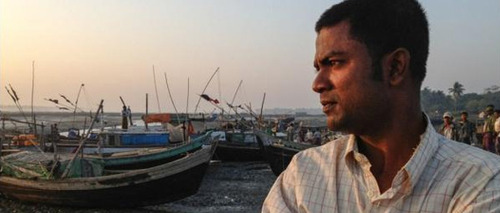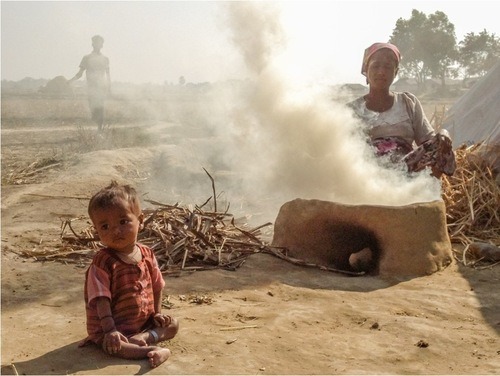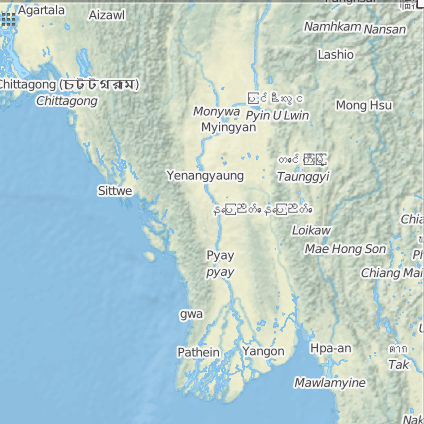
Photo of Abu Kalam, an ethnic Rohingya, as he prepares to leave Burma by boat. Images by Jason Motlagh 2013 via the Pulitzer Center
 By Leonard Doyle
By Leonard Doyle
Abu Kassim believes there is only one way out of a desperate situation he and his ethnic Rohingya family find themselves in - and that is to take their lives in their hands to cross the Bay of Bengal from Myanmar by boat and join fellow Muslims in Malaysia.
Soon the monsoon storms will arrive, making travel in flimsy boats a perilous undertaking. The crossing of a few hundreds of miles will be based on dead reckoning without basic navigational equipment. If the voyagers are lucky the crossing will take up to two weeks. Unlucky and they could be consumed by the ocean.
The United Nations calls the Rohingya people of Western Myanmar one of the most persecuted minorities in the world. Of the 13,000 mostly Rohingya Muslims who fled Burma and Bangladesh last year, at least 485 are known to have drowned at sea. Indeed their peril is not just at sea. More than 800 Rohingyas were rescued in raids on trafficking networks in southern Thailand this January. Thai media reports said that several senior army officers are under investigation.
We know about the fate of Kassim, 26, because of the work of The Pulitzer Center on Crisis Reporting, an innovative award-winning non-profit journalism organization dedicated to supporting the independent international journalism that media organizations are unable to undertake. The Center focuses on under-reported topics like migration, and promotes high-quality international reporting which provides exclusive pieces to some of the biggest media organizations in the world.
The center builds collaborations with foundations and academic institutions to ensure that global health journalism has a robust future. The Pulitzer Center’s collaborations are aimed at addressing the neglect of systemic global issues in mainstream media. In this way, international reporting of important human rights issues is being kept alive. In the case of Myanmar’s Rohingya people, the subject of an ongoing murderous campaign of sectarian violence, the Pulitzer Center is keeping it before the public eye by funding award winning journalists to travel and report, now that major newspapers and TV are increasingly unable to justify doing so.
That’s how Kassim’s story, reported by Jason Motlagh, made it into this week’s Washington Post. As Motlagh reports, Kassim has survived on handouts in a makeshift IDP camp, unable to return to their home community and hemmed in by military checkpoints. “There are no opportunities here for us, no hope,” he told Motlagh. “We are prisoners.”

Photo: Jason Motlagh
“The government wants to make us miserable, to push us out,” said another man, San Shwe Maung, 30, an unemployed teacher. He told Motlagh that Rohingya-owned businesses have been appropriated by the state. “We are like the second Jews.”
Only one Muslim district remains in the once-diverse capital, Sittwe, today. Motlagh describes entry points choked by barbed wire barricades. He recounts how on a recent morning, “a line of monks in maroon robes walked past the charred remains of empty homes and a neighborhood mosque reduced to a concrete slab.”

Map of Myanmar, via Openstreetmap.org
The sprawling camps west of the city now hold more than 100,000 people. Armed guards stand at checkpoints to ensure that those who have left do not return. Most families uprooted by the violence receive a monthly supply of rice, palm oil and chickpeas from the United Nations, but the funding that supports that effort will run out by April and must be renewed before the summer rains arrive.
For IOM, fair international reporting about the fate of displaced people reveals the scale of vulnerability and emergencies around the world. While needs assessments remain the bedrock of the international emergency response system, it is reporting via the media that creates the emotional response that ensures that governments remain responsive and provide the funds to assist.
In the future, we plan to showcase some of the reporting by The Pulitzer Center, in particular as it touches on issues at the core of IOM’s work: migration and displaced people. Please click here to receive Pulitzer Center email updates.
Leonard Doyle is the head of Online Communications for IOM